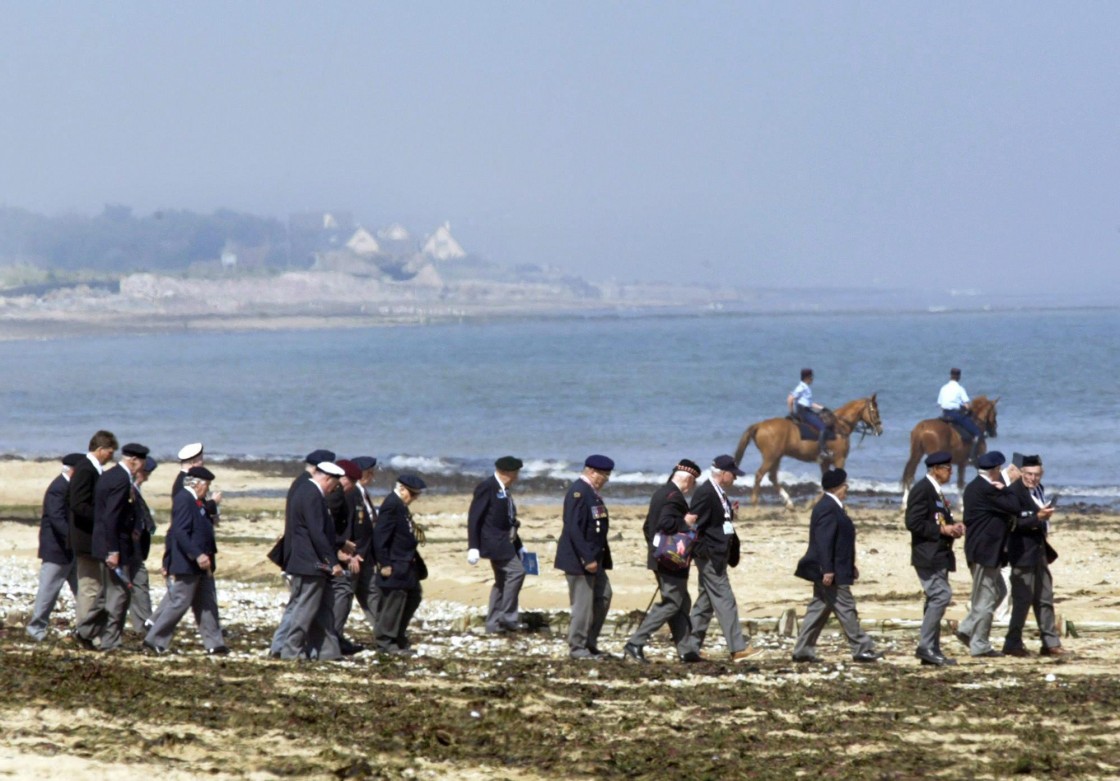TORONTO – For decades visitors to the D-Day beaches on the northwest coast of France have looked out at the English Channel, taking in the journey made by Allied troops that marked a turning point in the Second World War.

The view from some of those sites – including Juno Beach where 359 Canadians died – could soon change if a plan succeeds to build an army of wind turbines some 10 kilometres offshore.
Canadians now have a chance to voice their opinions on that plan as a French commission holds public consultations on the project.
The body has made it a point to invite people from Canada, the U.S. and Britain to weigh in and notes that even if the project goes ahead, the company building the 75 turbines will work to deal with the issues raised.
The entire turbine proposal rankles at least one Canadian who fought at Juno Beach.
“I personally am very much against it,” Roy E. Eddy told The Canadian Press. “I know a number of people have said they don’t agree with me, and I’m not disputing that, but I still say it’s going to be very disrespectful.”
The 88-year-old, who last visited Juno Beach three years ago, vividly recalls the bloody battle.
“I still have nightmares about it,” said Eddy, who served on the frigate HMCS Outremont but was assigned as the crew of a landing craft on D-Day.
- Canadian man dies during Texas Ironman event. His widow wants answers as to why
- ‘Shock and disbelief’ after Manitoba school trustee’s Indigenous comments
- Several baby products have been recalled by Health Canada. Here’s the list
- ‘Sciatica was gone’: hospital performs robot-assisted spinal surgery in Canadian first
“I had about 35 men in my landing craft, they gave me the signal to drop the ramp…only nine got off alive…I lost a lot of very good friends.”
The federal government, well aware that some Canadians disagree with the French plan, says it’s tracking the progress of the proposed wind farm.
“We understand and share the concerns of those who fought for freedom,” said Jean-Christophe de Le Rue, a spokesman for Veterans Affairs Minister Steven Blaney.
“Minister Blaney has asked his senior officials on the ground in France to monitor the situation and to report directly to him.”
Despite some opposition expressed in Canada, the Juno Beach Centre at the famous site itself isn’t taking issue with the turbine proposal, but it is monitoring the progress of the French consultations.
A group in France known as the European Platform Against Windfarms hopes more Canadians will speak out against the planned wind turbines in the coming weeks.
“We are just at the beginning,” chairman Jean-Louis Butre said in interview from Paris. “We want to protest, very strongly protest.”
Butre’s group – one of the more vocal opponents of the project planned off the coast of Courseulles-sur-mer – is planning to write a letter to UNESCO asking the international body to “immediately classify” the D-Day beaches as world heritage sites.
The group is also planning to send letters to leaders of the countries whose troops took part in the D-Day landings.
“All this area from Juno, from Sword from Omaha, we will see only wind turbines,” Butre said. “If you want to save history of humanity I think it’s one of the key sites of the world.”
The body holding the wind farm consultations until July 20 is described as a “neutral and independent” ad hoc commission by France’s National Commission for public debate.
Eleven open debates are being held on the project with one of them, on June 12, meant specifically to discuss the effect of the planned turbines on historic sites, the countryside and the environment. That meeting will be translated into English.
Canadians with views on the project can send in their opinions and ask the commission to answer their questions. They can also sign up to receive updates from the commission.
“The public debate process is open to all,” the commission says. “The location of the project off the D-day landing beaches fully justifies the participation of any British, Canadian and American nationals who may have concerns.”
Once the consultations are compete, the commission will publish a report that will be submitted to the contracting authority which will use it to “make an informed decision.”
Historian Rudyard Griffiths argues Juno Beach is a significant site to Canadians but a lack of awareness about the wind farm project could be why a strong Canuck voice currently seems missing from the conversation.
“The key thing is, will (the turbines) affect, along that stretch of beach, the original perspective of the horizon that Canadian soldiers looked back upon as they unloaded from their transports and landed on the beach?” asked Rudyard, the author of “Who We Are: A Citizen’s Manifesto.”
When contemplating that question, military history expert Terry Copp argues the landscape around Juno Beach has already been altered.
“If you allow your glance to turn slightly to the right rear, you see some of the ugliest condominiums in creation, crowding into the actual battlefield,” said the professor at Wilfrid Laurier University, who has been to Juno Beach several times.
“That and many other such buildings along the invasion coast are far more likely to impact upon your sense of place at Juno than wind turbines at 10 kilometres off shore.”
Anyone hoping to appreciate the historical significance of the sites today needs to get a little creative, said Copp.
“The basic contours on the landscape, either on the beaches or elsewhere haven’t changed, and you have to use a little bit of imagination to recreate the feeling of the time.”



Comments